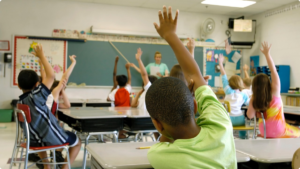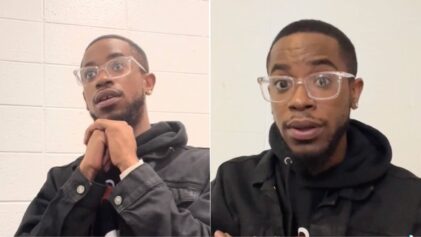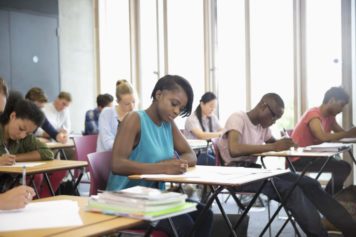
Now, while in tenth grade at Cristo Atlanta Jesuit High School in midtown, Taylor feels that her perspective on life has been completely shaped by the way she has been schooled.
“There are some things that public schools neglect to prepare students for as much as private schools in my opinion,” she says. “In private schools, they expect greatness and that’s what they prepare us for, but many public schools accept mediocrity and don’t push for anything more than that. That’s not preparing us for the world.”
Cristo Rey students are selected during their freshman year for a work-study program that helps to subsidize their education, which can provide up to $2,500 annually. While some parents are unable to pay out of pocket of for their child’s education, some of the performance statistics for Atlanta Public School (APS) and other metro Atlanta school systems are disturbing.
The College and Career Ready Performance Index (CCRPI) is used by the Department of Education to measure how prepared students in Georgia are in pursuing post-secondary education. In Atlanta Public Schools, nearly 82.8 percent of elementary school students met the participation requirement for English Language Arts (ELA), but only 69.7 percent of those students are performing well enough to move from one performance band to process and retain new skills within the subject matter to the next. Furthermore, the data revealed that APS, which is primarily populated within the inner city, had only a 57.4 percent graduation rate for the class of 2014. Early College High School at Carver was the only school that year with a 100 percent graduation rate.
Barry Howard, a teacher at the Eddie White Academy in Clayton County, said that while economic barriers in students’ home lives may be a distraction, it’s a parent’s character that gives him hope for his pupils.
“Education has a lot to do with character,” he says. “Kids with good character from poor families tend to improve. People with strong character can see the value of education.”
Howard, 36, said that he feels that having a strong county can contribute to schools, whether public or private. He says that what’s making charter schools and private schools much more popular is that they offer a more specialized curriculum leaning towards a student’s gift or strong suit, which is especially concerning for some parents since APS announced months ago that they would be pulling the music program from elementary schools.
The 2014 CCRPI Cohort Grad Rate reported that Clayton County has a 61.6 percent graduation rate among African-Americans while Hancock County in Middle Georgia touts a 90.1 percent graduation rate for African-Americans.
Dr. Kami Anderson, the director of the Undergraduate Honors Program at Kennesaw State University, said that it alarms her that she is seeing more students come to college ill prepared with the basics to write a paper. When she and husband Jeffrey Anderson planned their family of four, they both agreed that learning a foreign language would be a seed they could plant in securing success for their kids.
“We were both committed to having a global child,” said Dr. Kami Anderson. “By learning a second language early, they will be able read, write, and speak it fluently.”
Jeffrey Anderson, who works with kids in the juvenile system through Youthbuild, said that they spend $693.00 per child per month in tuition to ensure that their four-year-old son and twin two-year-olds are becoming fluent in Spanish at Smyrna Bilingual Academy in Cobb County.
“We support the public school system, but some of the kids I work with in the juvenile system come from schools where they were so focused on test scores that the kids didn’t learn the material,” he says. “Now, they are trying to get their education and learn a trade, primarily in the construction trade.”
The Andersons enrolled their oldest son in first grade last week at Perkerson Elementary, an APS school, because there is a language immersion program from grades K-2 to keep students continuously engaged in bilingual fluency.
The couple believes that while parents may have the means to abandon the public school system for the prestige of private schools, their family is willing to help strengthen the potential of what could happen when parents stay to fight for a better for the system from within.


